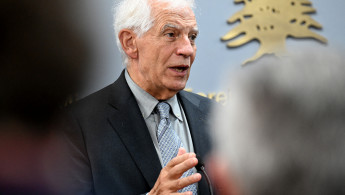EU's Borrell urges Hezbollah-Israel de-escalation during Lebanon visit
The European Union's top diplomat, Josep Borrell on Thursday called for de-escalation on the Lebanon-Israel border during a visit to Beirut amid ongoing fears of an all-out war between Israel and Hezbollah.
"Since I last visited Lebanon in January, the drums of war have not stopped pounding," Borrell said, noting that as of yet, a full-blown conflict in south Lebanon "has not happened".
"That's good news," he said during a news conference with Lebanese Foreign Minister Abdallah Bou Habib.
"We need to de-escalate military tensions," he added, urging "all sides to pursue this path".
Borrell's visit coincided with cross-border fire on Wednesday night and Thursday morning between Iran-aligned Hezbollah and Israel.
Hezbollah said it launched several attack drones at an Israeli military base Nahal Gershom, "targeting the positions of its officers and soldiers".
It also said it hit the Israeli town of Rosh Hanikra opposite Naqoura for the first time on Thursday and claimed to have fired Katyusha rockets deeper inside Israel, well beyond the border region.
Several villages in south Lebanon came under Israeli air strikes on Thursday, including a drone strike on an Iran-funded park in Maroun al-Ras while artillery shells hit several other sites along the border.
As war raged in the Gaza Strip since October, Hezbollah has traded near-daily fire with Israeli forces in support of the Palestinians.
Repeated escalations have punctuated the cross-border clashes, along with flurries of diplomatic activity to avert a wider conflict, most recently last month after an Israeli strike in July killed a top Hezbollah commander.
The US announced on Wednesday a round of sanctions against a Lebanese network it accused of smuggling oil and liquefied petroleum gas (LPG) to help fund Hezbollah.
The sanctions target three people, five companies, and two vessels that the US Treasury Department said were overseen by a senior leader of Hezbollah's finance team and used profits from illicit LPG shipments to Syria to aid generate revenue for the group.
Borrell said the EU was putting all its diplomatic efforts towards avoiding a broader escalation, particularly in south Lebanon, but added: "I don't have a magic wand".
"We have to continue pushing for a comprehensive peace in the region," he said at the end of a two-day trip to Lebanon after also visiting Egypt.
The EU diplomat also visited Lebanese army chief Joseph Aoun for talks on the border fire and the wider region.
Former war cabinet member Benny Gantz on Sunday said Israel should shift its focus toward Hezbollah and the Lebanese border, warning that "we are capable of... hitting the state of Lebanon if needed".
Borrell called for the full implementation of United Nations Security Council Resolution 1701, which "should pave the way for a comprehensive settlement, including land border demarcation and allowing" tens of thousands of displaced people to return on both sides.
The resolution ended a 2006 conflict between Israel and Hezbollah and called for the Lebanese army and United Nations peacekeepers to be the only armed forces deployed in south Lebanon.
Lebanon and Israel demarcated their maritime frontier in 2022 but disputes over the land border remain unresolved.
Bou Habib reiterated Lebanon's commitment to "the comprehensive and balanced implementation" of Resolution 1701.
Borrell also met with other officials including Prime Minister Najib Mikati and parliament speaker Nabih Berri, a Hezbollah ally, and on Wednesday visited the headquarters of the UN Interim Force in Lebanon in the border town of Naqura.
The cross-border violence since early October has killed some 619 people in Lebanon, mostly fighters but also including at least 138 civilians, according to an AFP tally.
On the Israeli side, including in the annexed Golan Heights, authorities have announced the deaths of at least 24 soldiers and 26 civilians.




 Follow the Middle East's top stories in English at The New Arab on Google News
Follow the Middle East's top stories in English at The New Arab on Google News
![A group of Palestinians, foreign and Israeli activists gather to participated in an olive picking event on the land in the town of Battir, which is under threat of confiscation by Israel in Bethlehem, occupied West Bank on 8 November 2024. [Getty]](/sites/default/files/styles/image_330x185/public/2182930803.jpeg?h=199d8c1f&itok=__0LgGsa)

![People gathered around the rubble of destroyed houses to search for survivors [Getty]](/sites/default/files/styles/image_330x185/public/2024-11/GettyImages-2184733820.jpg?h=199d8c1f&itok=NiM1LO2f)